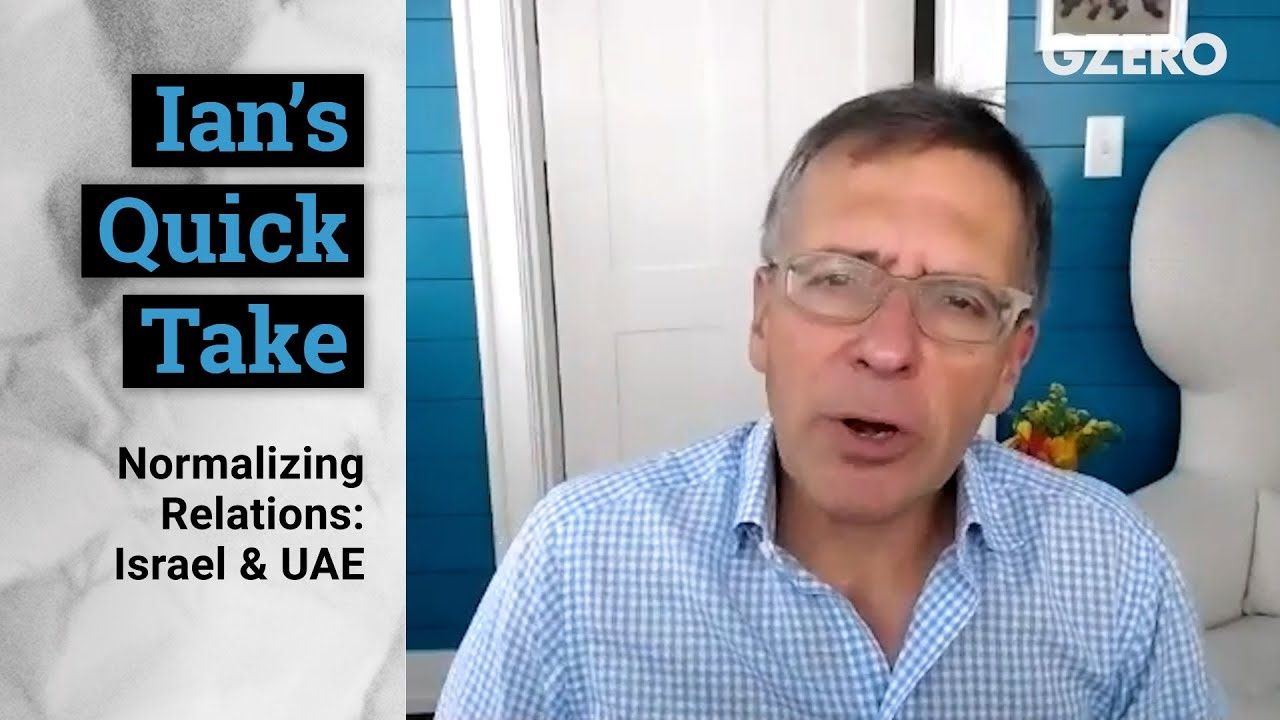Quick Take
Quick Take: Normalizing Israel & UAE relations

Ian Bremmer: Normalizing Israel & UAE Relations | Quick Take | GZERO Media

Ian Bremmer's Quick Take:
You may have seen the big news, that the United States facilitating normalization of relations between Israel and the United Arab Emirates, one of the Gulf monarchies. It is a real change in the way we think about the geopolitics of the Middle East. And it just shows how much times have changed.
If you go around the Middle East and ask Arab leaders what their priorities are, they'll tell you Iran, they'll tell you ISIS, al-Qaida, they'll tell you Syria, and Libya, they'll tell you Yemen, they'll tell you domestic instability, but they will not say Israel-Palestine. And that is so different than five, 10, 20 years ago when no willingness to talk to the Israelis unless you actually had some sort of successful peace negotiations between the two. Well, what's happening is the common enemy of Iran is becoming more important, the Palestinians are becoming less important, poorly governed, less powerful, and their former erstwhile friends and supporters are saying, "eh, we've got other priorities."
This is a big deal. And I said that back when Jared Kushner unveiled the peace plan, which, of course, was going to be much less of an attractive deal for the Palestinians in terms of land, allowing for the annexation of some of their territory by the Israelis in the West Bank, giving them a quilt work of territories that were not joined directly, building tunnels and roads to allow them somehow to have a Palestinian state. They were going to get a lot of money in return that was promised by the Americans and others in the region, but the Palestinians were not a part of putting the plan together. The Americans negotiated it basically themselves with their allies, Israel.
And not only that, but President Trump has been quite unilateral in changing the rules on the ground. You know that he, after decades of Congress and presidents calling to move the US Embassy from Tel Aviv to Jerusalem, he did it. And a lot of people complained all over the world, but nothing really happened. He also recognized the Israeli annexation of the Golan Heights, complaints in the region, no one really did anything. And the reality is that the Israelis are increasingly making the rules. The Palestinians are being left behind. And the fact that on the back of that, with Prime Minister Netanyahu, who is facing big corruption scandals at home and might not even last very much longer as PM and his unity government could easily fall apart, but Israel is in a much stronger position geopolitically than it has been before. And that's despite the fact that they've given absolutely nothing to the Palestinians.
I remember reading all of these New York Times op-eds from Tom Friedman saying that, you know, if Israel doesn't form a deal with the Palestinians, that will be it for Israel. Actually, that's not true. And it's because Israel doesn't need the Palestinians. It's a horrible thing to say. It's horrible, particularly for the Palestinians, because these are people that have no capacity for real employment, and education, and opportunity in Gaza. It's over 50 percent unemployment, extraordinary amounts of hunger and no opportunity, but also no opportunity to change the status quo. And they've had really bad governance for decades now, with Palestinian authority and with Hamas. And people just don't find the need to work with them anymore. They're being left behind.
Israel, meanwhile, one of the most effective advanced industrial democracies in the world. A great judiciary, media, open, transparent, educational system, healthcare system, as long as you're not Palestinian. And the fact that that is leading not only to no challenges at home, but even to changing the geopolitics in the region to their favor, breaking through in a way that no one could have anticipated 10 or 20 years ago, just shows you how much the Middle East is changing.
And does give President Trump one of the larger wins he's had diplomatically. And Lord knows we can point to a lot of failures. But this one is one he's going to run a couple laps around because they've seen the change in the Middle East and their pivot away from the Americans being the sheriff in the region, instead recognizing the new geopolitics, is something we're all going to coming to terms with over coming years.
Syrian President Ahmed al-Sharaa attends the military parade of the Syrian army in Umayyad Square in central Damascus to mark the one-year anniversary of the fall of the Assad regime, on Dec. 8, 2025.
A year ago this month, Syria’s brutal dictatorship collapsed. There are signs of recovery, but sectarian violence threatens to undermine the optimism.
In the latest twist to Yemen’s decade-long civil war, a group of government ministers declared support for the UAE-backed Southern Transitional Council (STC), a rebel group that broke the war’s deadlock earlier this month by seizing control of the oil-rich Handramout region.
Despite a ceasefire in Gaza, Israel is still not letting foreign journalists in to independently verify what’s happening on the ground, CNN’s Clarissa Ward tells Ian Bremmer on GZERO World.